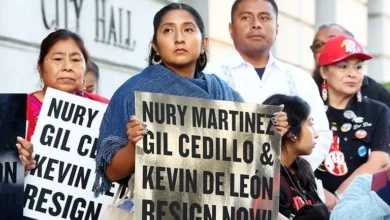‘Mosquita y Mari’ is about us
We met at the corner of Pacific and Gage, in the heart of Huntington Park. It was still morning and the whole area was filled with beckoning storefronts and extravagant cafés, but best of all was the crowd parading up and down the boulevard; young mothers pushing little ones in strollers, couples in seemingly happy reunions, salesmen and office workers taking a break, and La Raza. Because this is a Latino Barrio.
And this is where director Aurora Guerrero is going to shoot her first feature film, “Mosquita y Mari.” “When people think about Latinos they often imagine East Los Angeles, Boyle Heights. They imagine a world of gangsters and cholos. Of stereotypes,” says Guerrero, who was born in San Francisco after her parents emigrated from Mexico. They met in the Mission barrio, where she initially wanted to film the movie. That’s where her roots are, and her script is personal. It happened to her.
“Mosquita y Mari.” is the story of two 15-years-old high school students, Yolanda Ontiveros and Mari Rodriguez, who forge a relationship sparked by sexual attraction and develop a friendship which reflects important and still-pressing issues: single mothers who need the help of their eldest daughters to get by; undocumented immigrants who must accept living in the shadows due to their legal status; high school students who want to break through despite social and economic impediments and fulfill the golden dream of going to college.
And also Homophobia: the ignorance, the difficulty encountered when parents and children try to communicate about such a taboo subject. “I want to talk about sexuality. I am attracted to the power of the [actual] violence within silence, a mixture so common in the reaction of parents…because in my house, we didn’t talk”, says Guerrero, who stares with the open, direct and sincere gaze of the dreamer.
And her parents’ dreams got lost. “Life turned into work… which was not always humane.” For 18 years, the Mexican restaurant they owned in Berkeley united the family. This is where each of the 3 siblings worked since the age of 8. “They were always thinking of us,” she stated. “That’s why they didn’t go back to Guadalajara.”
The way Guerrero speaks is a mirror of her generation: the cordial Spanish learned in the fields flowing into in the common Spanglish of today and into standard English.
“Here I like the big cities; in Mexico I like the rural areas.” Aurora Guerrero is a symbol of so many Hispanics born here to immigrant parents, and “Mosquita y Mari” will reflect this, for Los Angeles and for the whole world to see. And she hopes her film will open the debate about Homophobia among Latinos.
The concept is being expressed in the story with the innocence and tenderness of everyday behavior. With the intimacy of suggestion; nothing explicit. With the gentleness and softness of a quinceañera, “Mosquita y Mari” is not about coming out, but about coming of age,” she says. “Not homosexuality, but adolescence.”
However, according to a study published by GLSEN, Gay, Lesbian and Straight Education Network published last September with the participation of 7,200 LGBT students between 13 and 21 years, eight of every 10 of them where verbally harassed because of their sexual orientation, four were physically attacked, and six felt threatened in school. That’s another important reason to pay attention to this movie.
The project is supported by the Huntington Park chapter of CBE, Communities for a Better Environment. Once completed, the movie will be shown at a series of events designed to promote dialogue in the community.
In short, it is an idea that exceeds the personal story told by a new Chicana filmmaker. And it may come to the rest of the world very soon. “We want to start shooting by the end of June, for 20 days, here, in Huntington Park.”
But there is a problem.
“Our dream budget was about a quarter of a million dollars.” Through the Latino Public Broadcasting, the Sundance Institute, and a Ford Foundation fellowship, they received start-up funding which was a fraction of the total needed. The rest has to come through contributions from the community. Like its internet site states, fans of independent films “will have a unique opportunity to bring this film to life during the 30-day campaign that started on April 26th and ends at the end of May.”
The clock is ticking. There is not much time, and the need is urgent.
If everything goes well, the movie will be ready for the next Sundance Festival, says Guerrero with hopefulness.
“I want young people to learn from this movie, because I didn’t have it when I was a girl… they didn’t tell me that a woman can direct a movie,” stated Guerrero, who is also an adjunct professor of Art Appreciation and Psychology at San Jose’s National Hispanic University. Guerrero won an award from HBO and the New York International Latino Film Festival (NYILFF) for her short films. She created “Pura Lengua” (2005) and “Viernes Girl” (2005) and participated in the production of “Real Women Have Curves” (2002) and La Mission (2009).
The new Latino film in the United States had several good starts. A few years ago, titles such as “Real Women…” broke through the wide markets and showed — together with family scenes, labor problems and the presence of gangs — a cheerful combination of grace and comedy. Some of them, like “Stand and Deliver” (1988) or “Walkout” (2006, for TV), were about historical episodes of overcoming and rebellion.
Others, like “American Me” (1992), focused on the problems of youth in poor neighborhoods, where the abundance of drugs and the anguish of the immigrant experience added to impoverishment and convergence of youth criminals, crime and an alleged honor code and loyalty within these.
”Mosquita y Mari” is a project that takes an extra step forward, attempting to show the reality inside the Latino community that is not shown everyday. Not an absolute reality, but one that is sensitive, intimate. The story takes place in Huntington Park, the veteran city with an absolute Latino majority to the southeast of Los Angeles. There is where Yolanda and Mari met.
Yolanda, the only daughter of immigrant workers, wants to continue her studies and become a professional. Mari has to work so that her mother and two sisters can survive.
In school, Mari’s sense of justice leads her to rescue Yolanda from an incident in which Las Cuatas, twin sisters and childhood friends of hers for whom everything is fiestas, boys and texting, are implicated. Their friendship evolves after this, and takes us to a new place with a surprise ending.
To help:
Donation: http://www.kickstarter.com/projects/mosquitaymari/mosquita-y-mari-a-new-voice-in-independent-filmmak?ref=users
and http://www.kickstarter.com/profile/mosquitaymari
Write to MyM Productions LLC, 413 Sunset St, Santa Fe, NM 87501
Email: mosquitaymari@gmail.com
Phone: 323-630-0354
Website: http://mosquitaymari.com/
Twitter: twitter.com/mosquitaymari
Facebook: http://www.facebook.com/mosquitaymari
YouTube: http://www.youtube.com/mosquitaymari
Flickr: http://www.flickr.com/mosquitaymari











